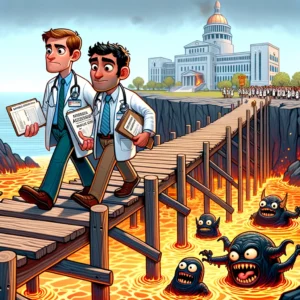
When most people think about medical school interviews, they assume that they’re something they’ll deal with at the very end of the application process. After all, as our consultant at Gurufi know well, applicants first have to complete their MCAT, AMCAS package, personal statement, Work & Activities, and a flood (hopefully) of secondaries. In a technical sense, they’re right: interviews are the end of a lengthy journey.
But, it is worth it to spend some time going and over and thinking about the most common interview questions and thinking about what your responses would be. There are two reasons. First, if these are the questions that the doctors, administrators, and (sometimes) medical students tend to ask in interviews, isn’t this a good insight into what they tend to look for? As such, having worked out your responses to them beforehand could provide some useful background guidance or content for your personal statements and secondaries. Second, there is value in reading through these questions early, exposing them to your brain, and letting your mind work through them over the course of months so that you can slowly -almost as a background process- develop nuanced, personal, and authentic answers to these questions so that if/when you get to the interview stage, you’re ready to go!
Indeed, I would urge you to get a notebook and do 10 minutes of writing and outlining / brainstorming for each one. Sketch out your initial ideas. As you do, you should hopefully began to get ideas for your personal statement or, later, secondaries.
- Why do you want to pursue a career in medicine? This question is often one of the first asked and is an opportunity for you to express your passion and motivation for the field of medicine. Be clear and concise in your answer, and highlight specific experiences or events that inspired your interest in medicine.
- What is your understanding of the role of a physician? This question is an opportunity for you to show your understanding of the responsibilities and duties of a physician. Highlight your understanding of the importance of compassion, dedication, and professionalism in the field of medicine. It also provides an excellent opportunity to talk about role models or doctors whose approach you admire.
- Can you discuss a specific experience that influenced your decision to pursue medicine? This question is a chance for you to highlight a meaningful experience that has shaped your decision to pursue a career in medicine. Be specific and share details about what you learned from the experience and how it has influenced your goals and aspirations.
- Can you discuss a time when you had to overcome a challenge? This question is asking about your problem-solving skills and how you handle difficult situations. Be honest and provide a specific example of a challenge you faced and how you overcame it. Often, this might end up being a moment where you failed. That’s fine! As we have discussed in other contexts, a thoughtful and genuine (non “humble-brag”) reflection on a failure can be a valuable part of your interview / application.
- What interests you most about the medical school you are applying to? This question is an opportunity for you to show your interest in the specific medical school you are applying to and why it is a good fit for you. Be sure to research the school ahead of time and highlight specific programs, opportunities, or resources that appeal to you.
- Can you discuss a time when you had to work with a difficult team member? This question is asking about your ability to work with others and handle conflict in a team setting. Provide a specific example and talk about what you learned from the experience.
- What are your long-term career goals? This question is asking about your future plans and what you hope to achieve in your career. Be clear and concise in your answer and show how your goals align with the mission and values of the medical school you are applying to.
- Can you discuss a time when you had to make a difficult ethical decision? This question is asking about your ethical principles and how you handle challenging ethical situations. Be specific in your answer and talk about what you learned from the experience.
- Can you discuss a time when you had to learn something new quickly? This question is asking about your adaptability and ability to learn new information quickly. Provide a specific example and talk about what you learned from the experience.
- Can you tell us about a healthcare issue that you are passionate about? This question is an opportunity for you to show your interest in and knowledge of healthcare issues. Choose an issue that you are passionate about and be sure to explain why it is important to you.
When it comes time to actually interview, you should revisit your responses to these questions and perhaps expand on them, noting information you’ve gleaned from the following steps:
- Research the medical school ahead of time and be familiar with their mission and values.
- Work you’ve done to make your answers more concise and specific.
- Moments from your life that display your passion and motivation for the field of medicine.
For more help with your personal statement, check us out at Gurufi.com. Our medical school personal statement editors and consultants have decades of experience helping clients get into top med schools. Our specialty is helping you craft compelling personal statements and refining Work & Activities sections and secondaries in ways that move the needle in your admissions process! For questions, shoot us an email at service@gurufi.com. Check us out on Facebook, Twitter, and LinkedIn.








